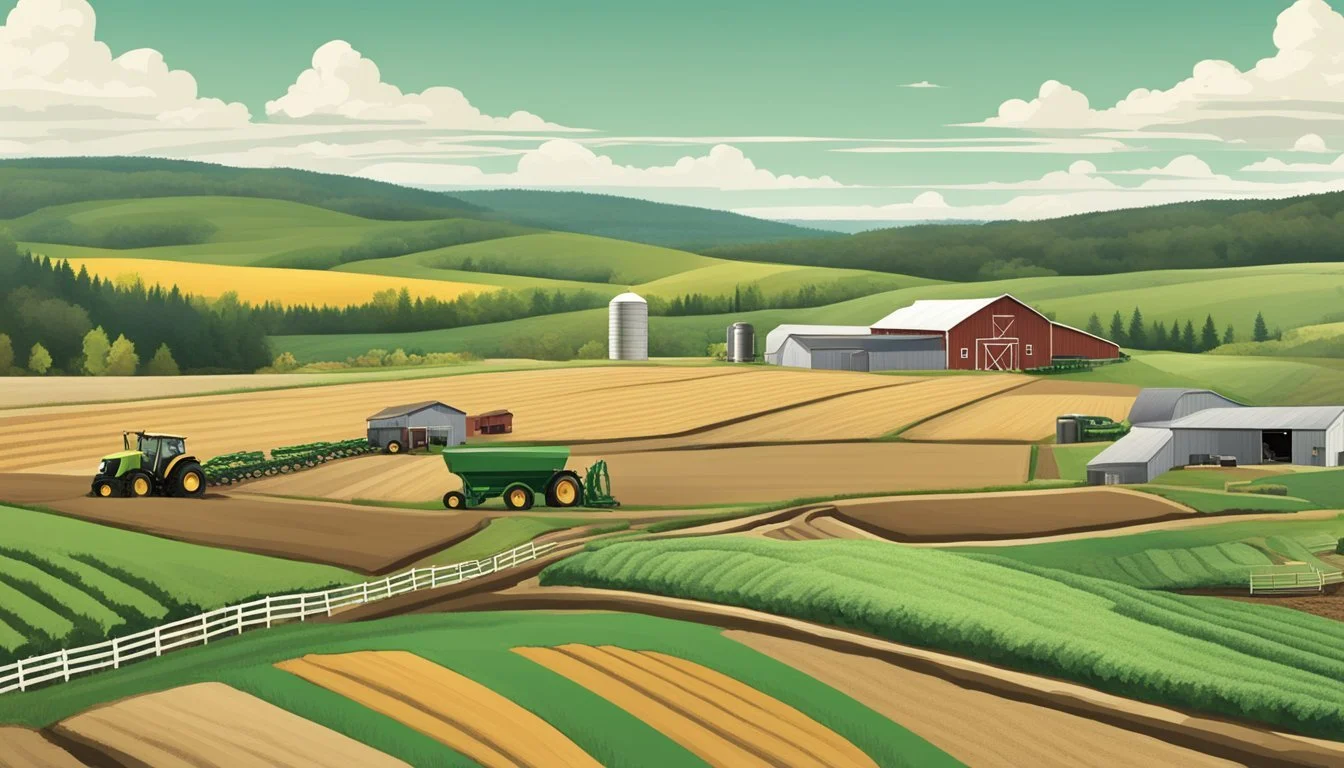Michigan Farm Land for Lease
Opportunities and Options
This Article is Part of Our Guide on Navigating Agricultural Leases Across the US
Michigan has long been associated with a rich agricultural history, as the state's diverse landscapes present opportunities for various kinds of farming. With a significant portion of Michigan's economy driven by agriculture, leasing farm land has become a viable option for both landowners and farmers. Leasing offers a flexible approach to land use without the long-term commitment or capital investment of purchasing property outright.
In Michigan, farmland for lease can range from small plots to hundreds of acres, suitable for a variety of agricultural needs. The leasing rates for such land are influenced by factors such as location, soil quality, and accessibility. These transactions are pivotal to supporting the state's agricultural operations, allowing for the cultivation of crops, raising livestock, and supporting the local food systems.
As the demand for locally grown produce rises and entrepreneurial farmers seek opportunities, the leasing of farm land in Michigan presents a valuable option. It allows both established and beginning farmers to access land for agricultural production while also enabling landowners to generate income from their property. The terms of leases can vary greatly, and it's essential that both parties involved thoroughly understand and agree upon the lease arrangements to ensure a beneficial partnership.
Understanding Michigan's Agricultural Landscape
In Michigan, agriculture forms a cornerstone of the regional economy, and the state's farmland is diverse in terms of crop variety and leasing arrangements.
Role of Agriculture in Michigan
Michigan's agricultural sector is a significant contributor to the state's economy, providing numerous jobs and substantial revenue. The state's farmers and landowners work together to maintain the rich agricultural tradition, with a variety of crops grown across the different counties. They emphasize sustainable practices and strive to incorporate both conservation and environmental methodologies.
Top Commodities: Michigan's top agricultural commodities include dairy products, corn, soybeans, and apples.
Employment: Agriculture provides employment for many in rural areas and supports related industries.
Sustainability and Conservation: There is a focus on sustainable agriculture and conservation, with both farmers and landowners encouraged to use best practices.
Overview of Michigan Farm Land
Michigan farm land is characterized by its versatility and the diversity of crops it supports. Farmland lease agreements in Michigan are governed by several factors to ensure fairness and productivity.
Leasing Arrangements: Fixed cash rent agreements are common, where landowners receive a set fee, independent of crop yield or price. There are also flexible arrangements such as crop share agreements.
Land Capability: The soil quality and climate across Michigan allow for the production of a wide range of crops.
Rental Rates: Factors influencing rental rates include agricultural use, nonagricultural use, and market conditions, with variations from county to county.
Rental Rate Trends:
County Status Number of Counties Rental Rate Trend Increased 36 Increase Decreased 22 Decrease No Change 4 Stable
Michigan's land values and leasing rates are periodically surveyed to provide current data to landowners and tenants, allowing for informed decision-making regarding land use and lease agreements. This ensures that even as market dynamics shift, the agricultural land in Michigan remains a valuable asset to the state's economic and environmental health.
The Basics of Farm Land Leasing
Leasing farmland can provide significant advantages for both landowners and farmers. Understanding the fundamental aspects of farm leases ensures mutually beneficial agreements are met.
Defining Farm Land Leases
A farm land lease is a legal contract between a landowner and a tenant, allowing for the cultivation of crops or raising livestock on the rented land. These agreements outline the terms and conditions under which the land will be farmed, including the duration, rent, and responsibilities of each party involved.
Benefits of Leasing Over Buying
Leasing farmland offers flexibility and reduced capital investment compared to purchasing. Tenants often prefer leasing as it allows them to:
Access land without the financial burden of a mortgage
Invest in farm operations instead of real estate
Adapt to changing market demands with shorter-term commitments
Landowners benefit through:
Consistent rental income
Land stewardship without direct involvement
Preservation of farm ownership within families
Common Types of Leases
There are several common types of farmland leases, each tailored to different needs and preferences:
Fixed Cash Rent:
The tenant agrees to pay a set amount per acre or lump sum regardless of crop performance.
Landowners are generally not involved in decision-making or farm expenses.
Flexible or Variable Leases:
Rent is tied to commodity prices, yields, or revenues, allowing for adjustments based on farm performance.
Crop Share Rent:
Landowner and tenant share the costs and revenues of the crops produced, often splitting input costs and profits.
Each lease type carries its own risks and benefits, and the choice often depends on local market conditions, farm profitability trends, and the individual circumstances of the landowner and tenant. Contracts should always be clear and detailed to prevent misunderstandings and ensure that the lease serves the interests of both parties. Farmland leases in Michigan, as exemplified in the search results, reflect a diverse range of rental agreements and rates that cater to the specifics of the local farming economy.
Current Market Trends
The patterns in Michigan's farmland leasing market are telling, with a noteworthy upward trend in rental rates and a consistent rise in land values over recent years.
2023-2024 Market Overview
Throughout Michigan, leasing rates have continued to show resilience, with 2023 figures indicating an ongoing increase. Crop land rental values have notably varied across the state, driven by soil productivity and the presence or absence of features such as tile drainage. In counties with higher productivity soils, rental rates have been higher, reflective of the potential for more lucrative specialty crops.
Recent Changes in Land Values
Since 2019, Michigan has witnessed a progression in farmland cash rent. Non-irrigated ground rental rates in 2019 were documented at an average of $89 per acre, an uptick from $86.36 in 2017. This trend signified an almost 58% increase in rental values over the decade prior to 2019. Entering into 2023, the momentum remained with pastures appreciating by 5.8% to an average of $2,900 per acre, and the overall cash rent for farmland in Michigan reaching $144, marking a steady climb from the prior year.
Land Lease Rates and Factors
When considering leasing farmland in Michigan, understanding the rental rates per acre and the variety of factors that influence these lease prices are crucial for making informed decisions.
Understanding Rental Rates Per Acre
In Michigan, farmland rental rates can vary significantly depending on the location and quality of the land. In 2022, rates ranged from as low as $20 per acre in counties like Alger and Delta to as high as $231 per acre in Huron County for non-irrigated cropland. These values reflect the diversity in rental rates across different regions, illustrating how county-specific factors can impact leasing costs.
Factors Influencing Lease Prices
Several factors can affect farmland rental rates in Michigan, including but not limited to:
Field Size: Larger fields often have lower rental rates per acre due to the economies of scale.
Soil Type: High-quality, fertile soil typically commands higher rental rates because of its potential for greater crop yields.
Cropping History: Farmland with a productive history can be more desirable and thus, more expensive.
Location: Proximity to infrastructure and markets can increase a property's value.
When considering leasing farmland, tenants and landowners should evaluate these variables to negotiate a fair rental agreement, reflecting both the quality of the farmland and the current market conditions in their county.
Legal Aspects of Land Leases
Leasing farmland in Michigan involves several legal considerations that both landlords and tenants must navigate thoughtfully. Proper understanding and execution of a land lease contract, maintaining a harmonious landlord-tenant relationship, and seeking appropriate legal aid are paramount.
Essentials of a Farm Land Contract
A farm land contract serves as the foundation for the leasing relationship. It should be comprehensive and outline key terms, including duration, rent, and use of the property. Essential elements to include in a written agreement are:
Parties' Details: Full names and contact information of the landlord and tenant.
Lease Terms: Start and end date of the lease, renewal options, and explicit statement of the lease being a rental agreement, not a sale.
Rental Amount: Payment schedule, amounts, and conditions.
Property Description: Clear and detailed description of the farmland being leased.
Use of Property: Specific allowed uses and any restrictions.
Improvements: Terms covering any improvements or alterations the tenant may or may not perform.
Landlord-Tenant Relationships
The relationship between a landlord and tenant is governed by the lease agreement and relevant state laws. Responsibilities of each party should be clearly outlined, including maintenance, repairs, and reporting requirements. In addition, a documented process for handling disputes and the terms for termination of the lease should be established to minimize conflicts.
The Role of an Attorney in Land Leasing
An attorney specializing in real estate or agricultural law can offer indispensable guidance throughout the leasing process. They ensure the written agreement complies with all legal requirements and protects both parties' interests. Their intervention can be particularly crucial when drafting complex clauses related to property improvements or lease termination.
Tools and Resources for Leasing
When entering into a farmland lease in Michigan, an array of resources and calculators are available from Michigan State University Extension and the United States Department of Agriculture to support both landlords and tenants in developing equitable agreements.
MSU Extension and Leasing Guides
Michigan State University (MSU) Extension provides a comprehensive checklist and fact sheets to aid in the creation of well-designed lease agreements. They emphasize the necessity of considering all components of a lease and offer resources for both tenants and landlords. For detailed guidance, these tools can be accessed:
Farm Rental Contract Checklist: A tool to ensure all elements of a lease are discussed and agreed upon.
Cash Farm Lease PDF: A template lease form that can be used as a starting point for negotiations.
Using the USDA TELFarm System
The USDA's TELFarm system is an accounting system that can help farmers in Michigan make informed management decisions based on farm record data. It includes components for tracking various types of leases and the financial implications of each. Resources relevant to TELFarm include:
USDA Farmland Cash Rental Information: A compilation of survey data by the USDA that provides insight into cash rental rates, assisting in the evaluation of lease terms.
Land Rent Tools: These calculators from various universities, including MSU, aid in estimating fair rental rates based on multiple factors such as land quality and market conditions.
Best Practices for Land Leasing
Leasing farmland in Michigan requires consideration of legal, financial, and agricultural factors to ensure a beneficial arrangement for both the landowner and the lessee.
Preparing to Lease or Rent Land
Before entering into a lease, landowners should conduct a thorough survey of the property to ascertain its value and potential. This includes understanding soil quality, previous crop yields, and any zoning regulations pertinent to the land use. Landowners should also research current real estate trends to set competitive yet fair rental rates for their land in Michigan.
Creating Strong Lease Agreements
A robust lease agreement is central to a successful farmland rental transaction. The agreement should be a written document, capturing all terms clearly to avoid future disputes. It's imperative for both the landowner and lessee to:
Agree upon the lease duration: Determine whether it's a short-term or long-term lease.
Specify the rent: Decide if the lease will be a cash rent, adjustable rent, or a sharecrop agreement, where risks and profits are shared.
Outline the land use: Clearly delineate permitted uses of the land, such as the types of crops or livestock allowed.
Address land management practices: Establish expectations for soil conservation and field maintenance.
Include conflict resolution protocols: Have a clear process for handling disagreements or breaches of the agreement.
Both parties should review and understand all aspects of the lease before signing to ensure a transparent and legally sound arrangement, fostering a successful partnership in Michigan's agricultural landscape.
Navigating Lease Renewal and Termination
When dealing with farmland leases in Michigan, it's crucial to understand the mechanics of both renewing and terminating agreements. The lease contract should clarity all terms, protecting the interests of both the tenant and the landlord.
Negotiating Lease Terms
Timing: A typical lease contract should clearly define the length of the agreement. Tenants and landlords need to negotiate terms well before the renewal date, allowing time for adjustments to be made.
Rate Determination: Fixed cash rent agreements are common, where the tenant pays a set fee regardless of farming outcomes. However, flexible arrangements can also be negotiated based on yields or prices.
Handling Lease Termination
Legal Notice: State laws mandate specific deadlines for notifying lease termination. In Michigan, landowners or tenants must be aware of these deadlines to ensure compliance.
Early Termination Conditions: Under certain conditions, such as death or disability, Michigan law permits early termination of farmland leases. Both parties should be conversant with these terms, which should be articulated in the lease.
Future of Farm Land Leasing in Michigan
The future of farm land leasing in Michigan is shaped by emerging trends and past data, indicating changes in rental rates and leasing practices.
Predictions for Michigan Farmland
The leasing landscape in Michigan seems subject to gradual shifts in rental rates influenced by agricultural commodity prices and the economy. Rent for irrigated and non-irrigated farm land is likely to continue to diverge due to variance in crop yields and water availability. Irrigated land, typically commanding higher rents, may see an upward trend if demand for high-yield production increases. Conversely, non-irrigated land rents could feel the pressure of market fluctuations.
2019: Non-irrigated average rent – $120/acre; Irrigated farmland – over $220/acre.
2022: Rental values ranged from $20/acre to $317/acre.
Given these past figures, one might expect continued variability across counties. Certain counties may experience growth in rental rates due to increasing demand and higher commodity prices. However, this growth may be moderated by broader economic factors that affect farm profitability.
Evolving Leasing Practices
Leasing practices in Michigan are poised to evolve as landowners and farmers seek to balance profitability with sustainability. There may be an increase in flexible leasing agreements that take into account crop yield, commodity prices, and environmental stewardship. This could lead to a prevalence of variable rent agreements or bonuses for land maintenance.
Traditional Leases vs. Flexible Leases:
Traditional: Fixed payment, less adaptable to market changes.
Flexible: Variable payment, linked to performance metrics.
Farmers and landowners might increasingly rely on data from agencies like the USDA and extensions services to inform their leasing agreements. Technology and precision agriculture could also play a role in optimizing farm management and lease structuring, promoting a data-driven approach to renting farmland.
Conclusion
Michigan's agricultural landscape offers a diverse range of farm land for lease, catering to the farming community with possibilities that vary widely in terms of both price and use. In 2022, average rental values fluctuated, ranging from $20 to $317 per acre, reflecting the economic forces at play and the quality of the land on offer.
Prospective lessees should consider the current trends in farm profitability and land valuation, noting that these factors are influenced by economic policies, federal assistance, and market demand. Reliable contracts underpin successful leasing agreements, ensuring that terms are clear and beneficial to both parties. Landowners and lessees are equally advised to draft Farmland Lease Agreements with precision, delineating the expectations surrounding the use and maintenance of the land.
The demand for farmland in Michigan seems competitive, as it remains an essential component for agricultural success. Lessees should stay informed about the prevailing interest rates and inflation levels, as these economic indicators can impact leasing costs and overall farm income.
Given the information available and the observed trends, entities interested in Michigan farm land for lease should conduct thorough research, engage in strategic planning, and seek professional advice. This cautious approach will facilitate informed decisions, which are crucial in the dynamic environment of farming and land leasing.








